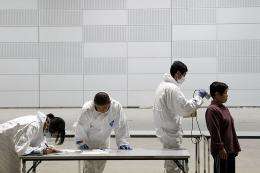Nuclear specialists share Japan radioactivity data

A UN agency that monitors for clandestine nuclear tests said Friday it was sharing its data about radioactivity levels in Japan with the world body's atomic watchdog and health organisation.
After the release of radiation from the Fukushima nuclear plant damaged in last week's earthquake and tsunami, there have been calls for radioactivity readings from the specialist agency's network to be made available.
The Preparatory Commission for the Comprehensive Nuclear-Test-Ban Treaty Organization (CTBTO) data would enable experts to calculate the course of the plume of radiation over the Pacific to the United States and other countries.
The body is normally only allowed to give the data with member states and not directly with the public.
However it confirmed in a statement that it would share its monitoring data and analysis reports with the International Atomic Energy Agency (IAEA) and the World Health Organisation.
This was after "respective requests communicated on March 17 to use its data in assessing the situation following the recent nuclear accident in Fukushima and the possible dispersion of radioactive substances in Japan and the wider region," it said.
The CTBTO uses a global network of hydroacoustic and seismic stations to detect nuclear bomb explosions and its data is also used in tsunami warning systems.
It is currently building a global verification system to detect nuclear explosions in an effort to verify a comprehensive ban on nuclear testing.
When complete, its 337-facility network of seismic, hydroacoustic and infrasound stations will watch underground, the oceans and the atmosphere, and its radionuclide stations will sniff the air for tell-tale signs of a nuclear explosion.
Nearly 270 monitoring stations, of which 63 are radionuclide sensors, are already operational and send data to the International Data Centre in Vienna for processing and analysis.
While the system is designed to detect nuclear blasts, it also picks up a vast amount of data that could potentially be used for civil and scientific purposes.
(c) 2011 AFP

















